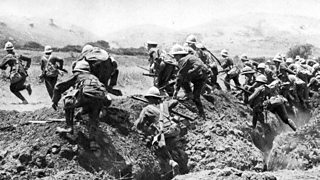12 words from 100 years ago we love to use today

Terrible though it was, the First World War did leave us something other than the horrors of trench warfare: some of our most beloved sayings and phrases grew from this time. The unique melting pot of men, languages and cultures forged a new kind of slang.
As the drama Tommies follows the lives of those on and behind the battlefront of World War I, we explore some of the words from that era that are still used today. Here is a dozen of our favourites…
Plonk
Abbreviated from the French "vin blanc" meaning white wine, this typical British soldier's alliteration eventually became the word for any kind of wine, as in, "pass that bottle of plonk".

Binge
Continuing with the theme of alcohol, binge was originally a Lancashire term meaning to over-indulge. Whilst the word can have negative connotations around food and drink, it's also used to describe life-affirming entertainment - from shamelessly listening to podcasts back-to-back, to watching the entire run of your favourite TV series in one sitting. Bliss.
Having a chat/chatting
Soldiers from the Commonwealth were often billeted with the British "Tommies", and that included several regiments from India. Whilst the word was used way back (e.g. evidence of its use can be found in Shakespeare's Romeo and Juliet), it's popularity grew, in this instance, from the Hindi word for parasite ("chat").
As the prevalence of lice was an everyday problem at the front, men sitting around picking them off their skin led to such groups being described as men "chatting". In later years this has morphed into the term "chatting" or "having a chat" to mean a group of people, or even two people, sitting around casually talking to each other.
Crummy
Lice were also directly responsible for this American slang term coined by US infantrymen, meaning lousy or of inferior quality. The eggs of the lice were white and resembled tiny crumbs of bread, hence the word "crummy".
Skive
From the french word "eskiver" meaning to dodge or avoid, this was used during WW1 as slang for shirking duty. In recent times "skiving off" implies a deliberate intent to stay off work, usually coupled with an elaborate excuse such as a dead aunt or an illness of some kind.

Camouflage
Another French word meaning disguise. In 1916 the word began to be used specifically as a term for obfuscating military targets using materials to blend them into their surrounding environment.
Cushy
Another word popularised by British soldiers but of Indian origin, this time springing from the Urdu word for pleasure – "Kusi" – and the Hindi word "Khush", meaning happy, easy or pleasant. "Cushy" is now defined as "undemanding, easy, or secure" and applies to any relatively comfy situation, and back then was used in a similar way to describe any military posting that was agreeable i.e. a cushy billet, or a cushypost, but also referred to a wound that was non-fatal yet debilitating, granting the victim some precious time away from the front.
Dud
This refers specifically to a shell or a bullet that failed to go off. Now its definition has expanded to include any object that does not work properly, or fails to work at all.
To be in a flap
This was a Naval expression dating from 1916 and refers to the flapping of birds, and means to be worried or excited. Later it became widely used by ground forces in WW1 and led to the term "unflappable" which appeared much later and means "marked by assurance and self-control".

Over The Top
When someone is exaggerating or behaving in a more pronounced way than need be they are being "over the top". Of course in WW1 this literally meant going over the top of the trench to charge the enemy, and most likely being mown down by machine-gun fire in the process.
Scarper
Another bastardisation of language, this time from the Italian word "escarpare" which means to run away. Although used before WW1, during the war the German fleet was scuppered at Scapa Flow and this re-established the word among English soldiers – to "scarper" being to "leg it" as fast as possible!
Bumf
Nowadays this refers to large amounts of paperwork, or useless and unwanted printed material such as junk mail. Soldiers in WW1 often used it to ridicule the ludicrous amount of orders and unnecessary paperwork that came from their superiors, likening it to toilet paper, i.e. "bum-fodder".
-
![]()
Tommies
Drama series following the lives of those on and behind the battlefront of World War I.
-
![]()
Seven of your biggest grammar bugbears sorted
Clearing up the top grammar gripes, queries and common mistakes.
-
![]()
Nine ways to succeed in meetings
Get some top meeting tips here.
-
![]()
1914: Day by Day
Historian Margaret MacMillan chronicles the road to war in 1914.




